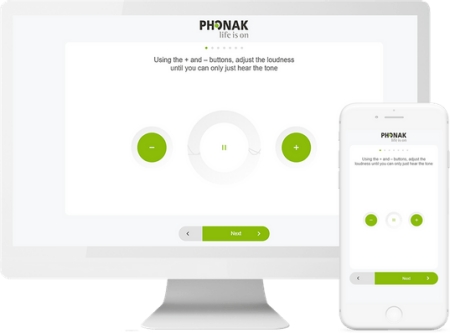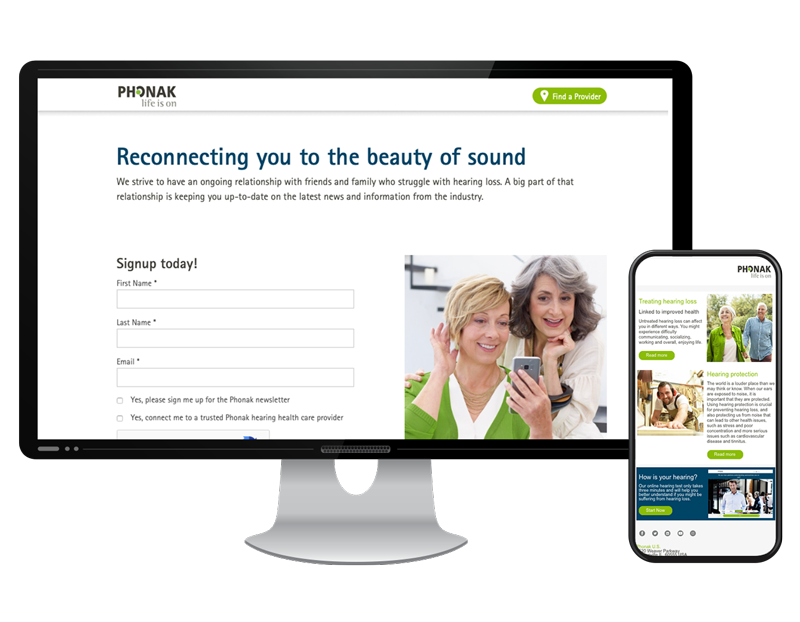備注:
* 在對接受助聽器治療的老年人進行的研究中,多數人在僅僅18個月後表現出穩定甚至明顯改善的認知功能。更頻繁使用助聽器與改善生活機能的執行力存在相關性。
1. World Report on Hearing, 2021. Accessible via World Report on Hearing (who.int)
2. MarkeTrak 11, 2022 https://hearingreview.com/inside-hearing/research/marketrak-2022-navigating-the-changing-landscape-hearing-healthcare
3. Kramer, S.E., Kapteyn, T.S., Kuik, D.J., & Deeg, D.J.H. (2002). The association of hearingimpairment and chronic diseases with psychosocial health status in olderage. Journal of Aging and Health, 14(1), 122–137
4. Vas, V., Akeroyd, M. A., & Hall, D. A. (2017). A data-driven synthesis of research evidence for domains of hearing loss, as reported by adults with hearing loss andtheir communication partners. Trends in Hearing, 21
5. Loughrey, D.G., Kelly, M.E., Kelley, G.A., Brennan, S., & Lawlor, B. A. (2018). Association of Age-Related Hearing Loss With Cognitive Function, Cognitive Impairment,and Dementia. JAMA Otolaryngology–Head & Neck Surgery, 144(2), 115-126
6. Jiam, N.T.-L., Li, C., & Agrawal, Y. (2016). Hearing loss and falls: A systematic review and meta-analysis. The Laryngoscope, 126(11), 2587–2596
7. Vercammen, C., Ferguson, M., Kramer, S.E., Meis, M., Singh, G., Timmer, B., Gagné, J-P., Goy, H., Hickson, L., Holube, I., Launer, S., Lemke, U., Naylor, G., Picou, E., Scherpiet,S., Weinstein, B., & Pelosi, A. (2020). Well-Hearing is Well-Being: A Phonak Position Statement. Hearing Review, 27, 18-22.
8. Ferguson, M.A., Kitterick, P.T., Chong, L.Y., Edmondson-Jones, M., Barker, F., Hoare, D.J. (2017). Hearing aids for mild to moderate hearing loss in adults. Cochrane Database of System Revue, 9. https://doi.org/10.1002/14651858.CD012023Kamil, R.J. & Lin, F.R. (2015). The Effects of Hearing Impairment in Older Adults on Communication Partners: A Systematic Review. Journal of the American Academy of Audiology, 26/2, 155-182 (28). https://doi.org/10.3766/jaaa.26.2.6
9. Karawani, H., Jenkins, K., & Anderson, S. (2018). Restoration of sensory input may improve cognitive and neural function. Neuropsychologia, 114, 203–213. https://doi.org/10.1016/j.neuropsychologia.2018.04.041
10. Sarant, J., Harris, D., Busby, P., Maruff, P., Schembri, A., Lemke, U. & Launer, S. (2020). The effect of hearing aid use on cognition in older adults: Can we delay decline or even improve cognitive function? Journal of Clinical Medicine, 9, 254. https://doi.org/10.3390/jcm9010254.
11. Sarant, J., Harris, D., Busby, P., et al. (2020). The effect of hearing aid use on cognition in older adults: Can we delay decline or even improve cognitive function? Journal of Clinical Medicine, 9(1), 254. https://doi.org/10.3390/jcm9010254
12. Negahban, H., Bavarsad Cheshmeh Ali, M., & Nassadj,G. (2017). Effect of hearing aids on static balance function in elderly with hearing loss. Gait Posture, 58:126-129. https://doi.org/10.1016/j.gaitpost.2017.07.112 Rumalla, K., Karim, A.M. & Hullar, T.E (2015). The effect of hearing aids on postural stability. Laryngoscope, 125(3), 720-723. https://doi.org/10.1002/lary.24974 Vitkovic, J., Le, C., Lee, S.L. & Clark, R.A (2016). The Contribution of Hearing and Hearing Loss to Balance Control. Audiol Neurotol, 21(4),195-202. https://doi.org/10.1159/000445100
13. Dawes, P., Cruickshanks, K. J., Fischer, M. E., Klein, B. E. K., Klein, R., & Nondahl, D. M. (2015). Hearing-aid use and long-term health outcomes: Hearing handicap, mental health, social engagement, cognitive function, physical health, and mortality. Int J Audiol, 54(11), 838–844. https://doi.org/10.3109/14992027.2015.1059503
14. Holman, J. A., Hornsby, B. W. Y. , Bess, F. H., & Naylor, G. (2021). Can listening-related fatigue influence well-being? Examining associations between hearing loss, fatigue, activity levels and well-being, International Journal of Audiology, DOI: 10.1080/14992027.2020.1853261
15. World Health Organization. (2021). World report on hearing. Geneva: World Health Organization. Retrieved March 8th, 2021. from, https://www.who.int/publications/i/item/world-report-on-hearing
16. Carr, K. (2020). 20Q: Consumer Insights on Hearing Aids, PSAPs, OTC Devices, and More from MarkeTrak 10. Audiology Online. Retrieved March 25, 2021 from https://www.audiologyonline.com/articles/20q-understanding-today-s-consumers-26648
17. Ehima. (2020). Hearing Aids improve Hearing - and a LOT more. Trends derived from the EuroTrak databases 2009 – 2020. Retrieved March 25, 2021 from https://www.ehima.com/wp-content/uploads/2020/07/EuroTrak-Trends-2009-2020-June-2020.pdf
18. Jorgensen, L., & Novak, M. (2020). Factors Influencing Hearing Aid Adoption. Seminars in hearing, 41(1), 6–20. https://doi.org/10.1055/s-0040-1701242






